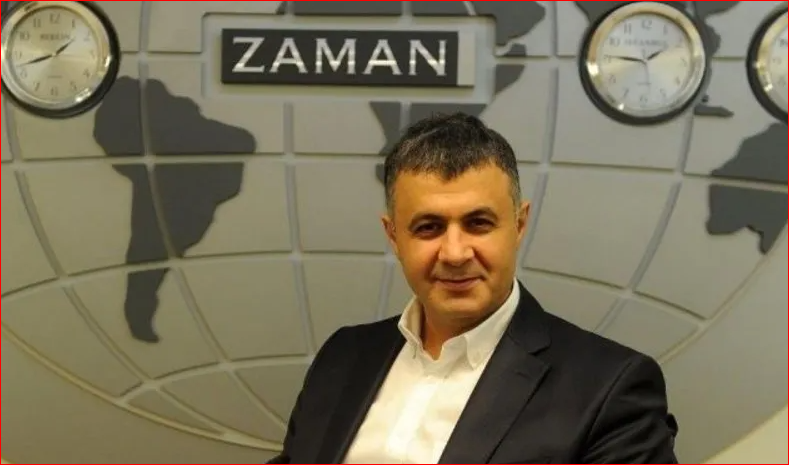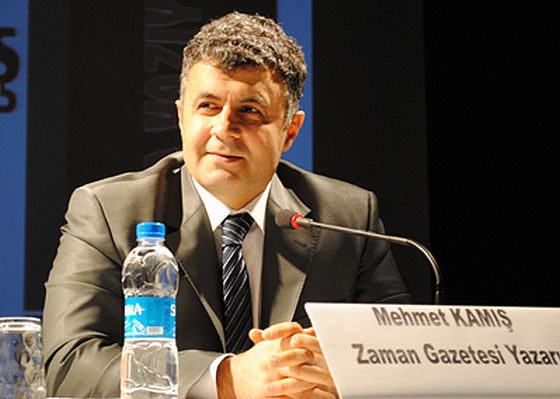Levent Kenez/Stockholm
Veteran Turkish journalist Mehmet Kamış was arrested by an Istanbul court on November 23. According to court documents obtained by Nordic Monitor, all charges against Kamış had been deemed non-criminal in a decision by the European Court of Human Rights in September.
Kamış was apprehended in the Çeşme district of İzmir on November 22 and was transported to Istanbul, where he was being tried in absentia for attempting to topple the Turkish government. Nordic Monitor has learned that National Intelligence Organization (MİT) officials were present during Kamış’s initial interrogation in İzmir, seizing his mobile phone and other digital materials for examination.
Kamış was deputy editor-in-chief of the Zaman daily, which was affiliated with the Gülen movement, a group critical of Turkish President Recep Tayyip Erdogan, and which was seized by the government on March 4, 2016. Kamış told the court that he had stopped practicing active journalism after this date due to the political climate in the country, which was no longer conducive to journalism.
People associated with the faith-based Gülen movement are labeled as terrorists by the government and tried as members of an armed terrorist organization. The government also accuses the movement of orchestrating a coup attempt on July 15, 2016.
Despite Turkey’s request for the extradition of the movement’s spiritual leader, Fethullah Gülen, who resides in the United States, US officials several times stated that Turkey did not provide any convincing evidence linking Gülen to the coup attempt in 2016.
Foreign governments have also expressed doubt: The intelligence agencies of the EU and Germany have said they remain unconvinced that Gülen ordered the coup.

The Foreign Affairs Committee of the UK Parliament in March 2017 stated that Fethullah Gülen and the movement he inspired as a whole were not behind the failed coup attempt in Turkey in July 2016, adding that “The Foreign & Commonwealth Office did not have evidence to justify the designation of the Gülenists as a terrorist organization by the UK, and the Committee agrees with this assessment.”
Kamış, along with 16 others, predominantly journalists from Zaman and other Gülen-affiliated media organizations, was being tried in absentia in 2017. The İstanbul 26th High Criminal Court decided to separate the files of the defendants who were at large, including Kamış, at a hearing on Sept. 19, 2017.
During the arrest hearing on November 23, the judge asked Kamış the name of the dormitory he lived in while attending university in Izmir in 1983. Kamış said it was the state-owned Bornova Dormitory and added that he later rented a house with friends. When Kamış expressed curiosity about the relevance of where he stayed 40 years ago as a university student to the current trial, the court did not pursue further questions on the matter.
The court also inquired whether Kamış knew the journalists and defendants listed in the case file. Kamış acknowledged familiarity with those he worked with at the Zaman newspaper but said he only knew some of the other defendants by name as fellow journalists. Ironically, the judges asked if he knew Ekrem Dumanlı, the editor-in-chief of Zaman, where Kamış had served as his deputy.
Kamış was also asked whether he had an account at Bank Asya. He mentioned opening an account in 1997 but emphasized that he had no other special relationship with the bank. When questioned about using ByLock, a messaging app, Kamış said he did not use the application.
A report prepared by the police’s cyber crimes unit showed that Kamış had never used ByLock; however, the court didn’t have access to the report during the trial.
The Turkish government accepted such activities as having an account at the Gülen-affiliated Bank Asya, holding an administrative position at a Gülen movement-linked institution, subscribing to the group’s publications, being a member of a trade union or other institution linked to the Gülen movement and using the encrypted messaging application ByLock as benchmarks for identifying and arresting tens of thousands of followers of the Gülen movement on charges of membership in a terrorist organization.
When asked if he wanted to invoke active remorse as provided by Article 221 of the Turkish Penal Code, Kamış said he felt no remorse for being a journalist.
Kamış informed the court that he had resided in Çeşme for seven years, pointing out its proximity to Greece’s Chios Island and saying he could have swum there if he had wanted to. He said he didn’t leave the country and asked the court to take this into consideration.
Accused of attempting to overthrow the government, Kamış faced a prosecutor’s request for his arrest, alleging membership in an armed organization due to his alleged use of ByLock and his managerial role at Zaman, without any specific charges being leveled. He was subsequently arrested and sent to Silivri Prison for pretrial detention.
Mehmet Kamış’s testimony in court:
On September 26, the European Court of Human Rights (ECtHR) ruled that the conviction of Yüksel Yalçınkaya, a Turkish teacher facing terrorism charges, which included accusations of using ByLock and having an account at Bank Asya, was unlawful. This decision held significant implications for the many individuals in Turkey facing similar charges.
The ECtHR determined that Turkey had violated three articles of the European Convention on Human Rights (ECHR): Article 6, ensuring the right to a fair trial; Article 7, prohibiting punishment without law; and Article 11, safeguarding freedom of assembly and association.
On March 21, 2017 a court in Kayseri sentenced Yalçınkaya, who remains in custody, to over six years in prison for alleged membership in a terrorist organization based on his purported use of the ByLock messaging app and having an account at Bank Asya. In 2020 he lodged a complaint with the ECtHR, claming that his rights had been violated.
Nordic Monitor previously disclosed a document revealing that the Turkish government had conducted a covert investigation into Kamış’s family members, including his spouse and children.
Dated January 24, 2017 a secret document exposed that Turkish prosecutor Can Tuncay ordered the police to investigate the parents, spouses and children of 19 critical journalists, including prominent reporters who had been imprisoned by the Erdogan regime.
Turkey’s anti-terrorism legislation has been criticized by the European Union, the Council of Europe, the United Nations’s human rights bodies and international human rights organizations for years. A joint UN letter authored by special rapporteurs underlined that Turkey’s anti-terror law (No. 3713) does not comply with its international legal obligations and that the country’s anti-terror legal framework should urgently be revised. According to the letter, the anti-terror law limits the exercise of the freedoms of opinion, expression and association and impacts the right to a fair trial and the prohibition of arbitrary detention.
The Erdogan government has frequently been accused of labeling its critics as terrorists and using the judiciary it controls to imprison them. Turkey is by far the leader in the number of prisoners convicted of terrorism in Europe, according to the 2021 Council of Europe Annual Penal Statistics on Prison Populations report, better known as SPACE I.
According to a previous analysis by Nordic Monitor based on SPACE I data, 32,006 people convicted of a terrorism-related crime are currently behind bars in Europe. A total of 30,555 of these people, or 95 percent, are in Turkish prisons. In other words, Turkey hosts almost all prisoners convicted of terrorism in Europe. Turkey is followed by the Russian Federation with 1,026 prisoners, or 3.2 percent of the total number of terror prisoners. Spain is in third place with 195 inmates.
According to official statistics, terrorism investigations were launched into 2 million people between 2015 and 2020. Given the fact that 59 million Turkish citizens are over the age of 18, one in every 30 people has faced trumped-up terrorism charges.
According to the updated information provided by Justice Minister Yılmaz Tunç during the ministry’s budget meeting in parliament on November 21, legal proceedings have been initiated against 696,526 of these 2 million, of which 123,000 have been convicted and received various sentences.
Members of the Gülen movement constitute the overwhelming majority of those who were prosecuted and convicted.












